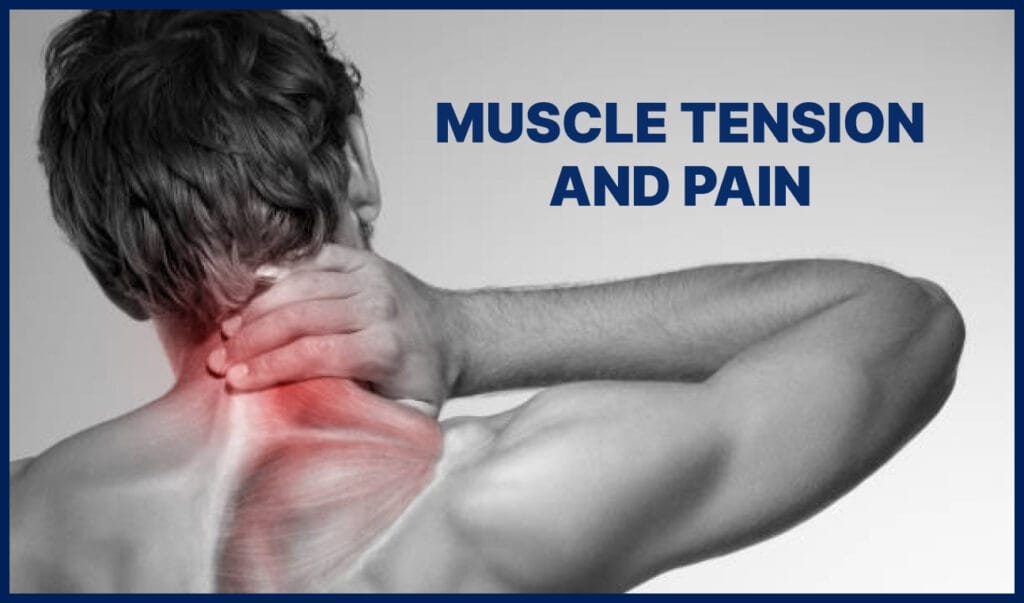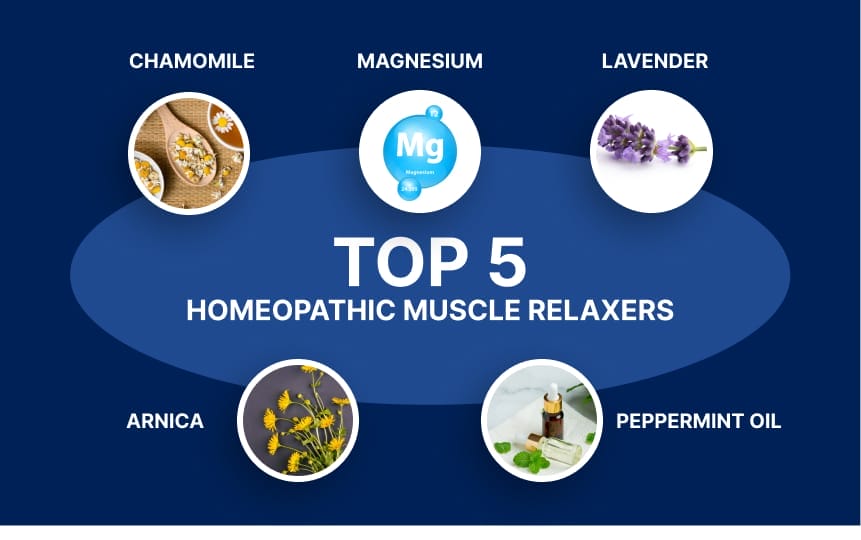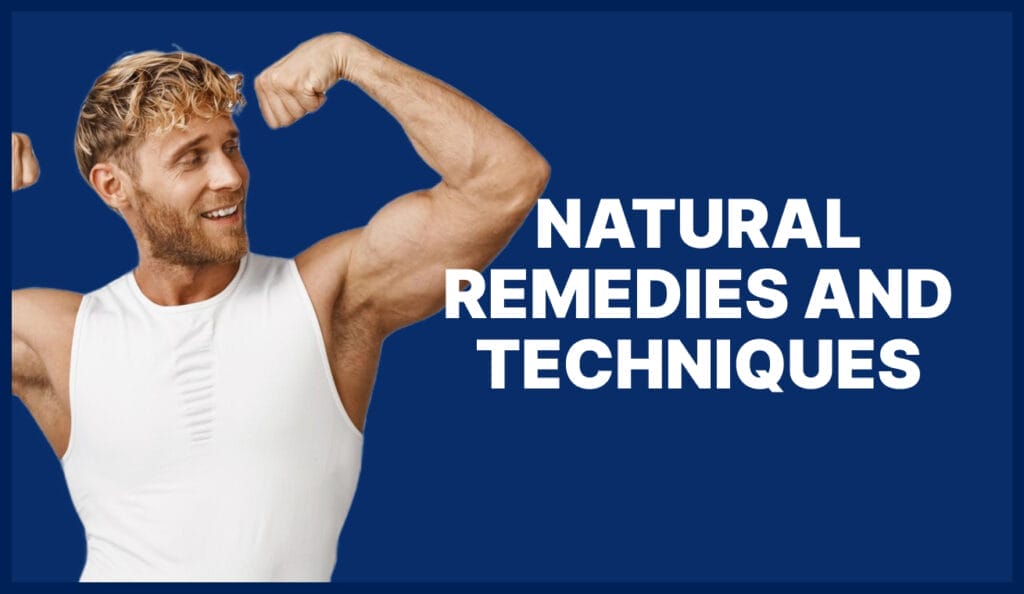Muscle tension can significantly impact your daily life, leading to discomfort and limiting your mobility.
Homeopathic muscle relaxers, derived from plants, minerals, and other natural sources, are increasingly sought after for their effectiveness in easing muscle pain and improving overall well-being.
This guide explores the top 5 homeopathic muscle relaxers, providing insights into how they work and tips for using them safely and effectively.

Understanding Muscle Tension and Pain
Homeopathic remedies are based on the principle of “like cures like,” using minute amounts of natural substances that, in larger doses, would produce symptoms similar to the condition being treated. This method encourages the body’s natural healing processes, targeting the root cause of muscle tension and providing a more holistic form of relief than pharmaceutical methods.
Homeopathic vs. Pharmaceutical Muscle Relaxers
Speaking of pharmaceutical medicine, the contrast between homeopathic and conventional therapies demonstrates varying results.
For instance, a study found that homeopathy usage in Germany for treating atopic eczema is prevalent despite not being officially recommended. However, an article by the FDA pointed out that homeopathic drugs have not always met modern standards for safety and effectiveness.
While direct comparison statistics between homeopathic and pharmaceutical muscle relaxers aren’t readily available, focusing on a few available pieces of evidence can be informative.
Natural muscle relaxers, including many homeopathic treatments, are often sought to address muscle tightness and pain. The interest in these treatments often stems from a desire to avoid the side effects of prescription muscle relaxers, which can include drowsiness and potential dependency. However, more rigorous studies are needed to fully evaluate the effectiveness of homeopathic muscle relaxers.
Despite a lack of comprehensive data, this trend towards natural and homeopathic remedies reflects a shift in consumer behavior towards holistic health and wellness.

Top 5 Homeopathic Muscle Relaxers
For muscle tension and pain, these homeopathic remedies have been recognized for their effectiveness and safety:
1 – Chamomile
Chamomile is renowned for its calming effects, which extend beyond soothing the mind to relaxing muscles. This herb contains flavonoids, which are compounds known for their anti-inflammatory properties, making chamomile tea or oil a go-to for natural muscle relaxation.
Whether consumed as a tea or applied topically as an essential oil, chamomile can help ease muscle spasms and reduce inflammation.
2 – Magnesium
Magnesium plays a pivotal role in muscle function, helping to regulate muscle contractions and reduce cramps. A deficiency in this essential mineral can increase muscle tension and pain.
Incorporating magnesium-rich foods like spinach, nuts, and seeds into your diet, or taking magnesium supplements, can support muscle relaxation and overall health.
3 – Lavender
Lavender is celebrated for its stress-relieving aroma, but its benefits extend to muscle relaxation as well. Lavender essential oil can be applied topically or used in aromatherapy to help reduce muscle tension and pain. Its anti-inflammatory and analgesic properties make it an excellent choice for soothing sore muscles and promoting relaxation.
4 – Arnica
Arnica is a herb used in homeopathy for its anti-inflammatory and pain-relieving properties. It is most commonly applied as a cream, gel, or ointment to reduce bruising, swelling, and pain associated with muscle strain.
While arnica should not be taken orally due to its potential toxicity, its topical application can offer significant relief for muscle discomfort.
5 – Peppermint Oil
Peppermint oil is known for its cooling sensation and analgesic properties, effectively relieving muscle pain and tension. When applied topically, it can help soothe sore muscles, alleviate headaches, and reduce discomfort from muscle spasms. The menthol in peppermint oil acts as a natural analgesic, providing a cooling effect that can distract from pain and promote relaxation.

5 Additional Natural Remedies and Techniques
Beyond the top homeopathic muscle relaxers, several natural remedies and techniques can further aid in muscle relaxation and pain relief.
Incorporating these methods can enhance your overall approach to managing muscle tension:
1 – Yoga and Stretching
Yoga and stretching exercises are excellent for relieving muscle tension and improving flexibility. Regular practice can help prevent muscle stiffness, reduce pain, and enhance mobility. Focus on gentle stretches and yoga poses that target your areas of tension, allowing your muscles to relax and recover.
2 – Homeopathic Muscle Creams/Lotions
Muscle creams and lotions are formulated to provide targeted relief from muscle cramps and tension. These products often contain natural ingredients known for their soothing and anti-inflammatory properties. Delcorean offers a prime example of such a product.
Developed through extensive research and feedback from patients, athletes, and trainers, Delcorean’s Cramp911 has gained recognition for its ability to alleviate muscle cramps quickly—sometimes in as little as 15 seconds after application. This makes it an invaluable solution for those seeking immediate relief from leg cramps, back and neck spasms, and
Individuals with conditions like Fibromyalgia have reported significant relief from muscle spasms lasting up to 8 hours. Cramp911 has also been helpful for cramps induced by medications, highlighting its versatility and effectiveness in a wide range of scenarios.
3 – Heat Therapy
Applying heat to tense or painful muscles can increase blood flow and relax the muscle fibers. To soothe sore muscles, use a warm towel or heating pad or take a warm bath.
Heat therapy is particularly effective for chronic muscle pain and stiffness.
4 – Cold Therapy
For acute injuries or inflammation, cold therapy can be beneficial. Applying an ice pack to the affected area can reduce swelling and numb the pain. It’s important to wrap the ice pack in a cloth to avoid direct contact with the skin and limit the application to 20 minutes at a time.
5 – Hydration
Staying well-hydrated is crucial for muscle health. Dehydration can lead to muscle cramps and increased tension.
Make it a habit to drink sufficient water throughout the day, especially before and after exercise or any activity that causes you to sweat.
Embrace Natural Solutions for Muscle Relaxation
Whether you’re dealing with occasional soreness or chronic pain, we encourage you to explore the benefits of homeopathic muscle relaxers and other natural remedies for muscle relaxation.
It’s important to remember that persistent or severe muscle pain should be evaluated by a healthcare professional.
Consulting with a doctor can ensure that any underlying issues are properly addressed and that you choose the safest and most effective treatment options for your needs.


